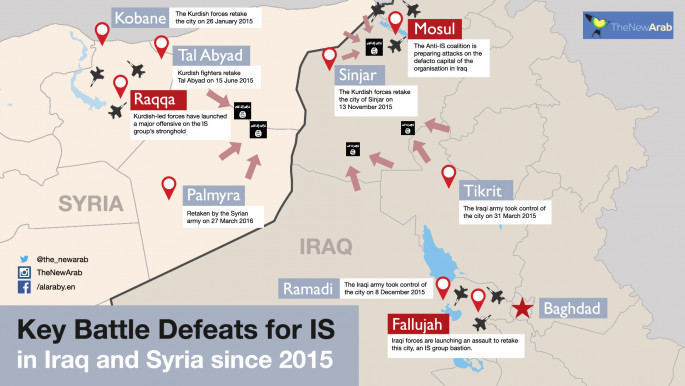Syria: Anti-IS forces lose ground as they take ground
In two different parts of Syria, anti-Islamic State group fighters are experiencing very different results.
In Raqqa province, a US-backed force of mostly Kurdish fighters are inching closer to IS' self-declared capital, Raqqa.
Further north in Aleppo province, Syrian rebel forces are performing badly and losing ground to IS fighters. The situation has become so dire that the falling of villages to IS is causing a new refugee crisis in Aleppo province.
Tens of thousands of Syrian refugees are confined to a sliver of land held by the rebels desperately fighting off the IS advance. To the north is the sealed Turkish border and hostile Kurdish militias to the west, leaving them with no place to go.
Rebel ground
In Azaz, rebels are turning back civilians fleeing for safety to the border town, saying they fear infiltration by IS militants among the throngs.
There have also been reports of clashes inside the town between fighters and IS "sleeper cells". Many fear it is only a matter of time before the town falls to IS, and the Syrian National Coalition opposition group has called for international support to the Free Syrian Army to fight the IS group.
Pablo Marco, regional manager for Doctors Without Borders, spoke to AFP and warned of the bleak conditions in the area.
He said that 100,000 civilians were just three miles from advancing IS militants.
"We are talking about 100,000 people who are trapped a few kilometres from IS. They are terrified, there is nowhere to go," Marco told AFP.
 |
| [click to enlarge] |
"These people are now in a very small area of four by seven kilometres. The situation is absolutely unsustainable and unacceptable for this population."
Some in the opposition are reportedly negotiating with Kurdish forces, to allow the civilians to seek refuge in their areas. Marco warned that the Kurdish-held area would struggle to cope with the influx, and instead Turkey was better positioned to take in the refugees.
Although concerned about the situation, Turkey is yet to open its borders, particularly as it suffers from almost daily IS rocket attacks on the border town of Kilis, just north of Azaz.
The civilian deaths have sparked anger among Turkish residents in southern Turkey. It makes it harder for President Recept Tayyip Erdogan to argue the case for opening the borders, as the risk of IS infiltration peaks.
Raqqa
In the battle for Raqqa, meanwhile, Kurdish-Syrian rebel forces are on the ascendency and cutting deeper into IS heartlands.
The Syrian Democratic Forces are advancing towards al-Tabaqa and the Euphrates Lake.
At least 16 IS fighters were killed in fighting with the Kurdish-rebel coalition over the past 24-hours, according to the Syrian Observatory for Human Rights.
The monitoring group said that at least 61 IS fighters had been killed in the past week, including 24 from the "Cubs of the Caliphate" child soldiers' unit. This tragic fact highlights the desperate nature of the jihadi group's defence, and its paradoxical situation - as its forces further north appear unstoppable.
Much of the advance has followed heavy air raids by US-led coalition forces. On the ground, there are an estimated 200 US special forces involved in the assault on Raqqa.
It is still unknown whether these troops are unknowingly involved in a "land grab" for the Kurdish forces, as has been claimed, or if this is a part of a more sustained effort to capture Raqqa city.
Either way, the situation in the province looks positive for the anti-IS coalition whose juggernaut advance appears to be unstoppable.
Agencies contributed to this story.


